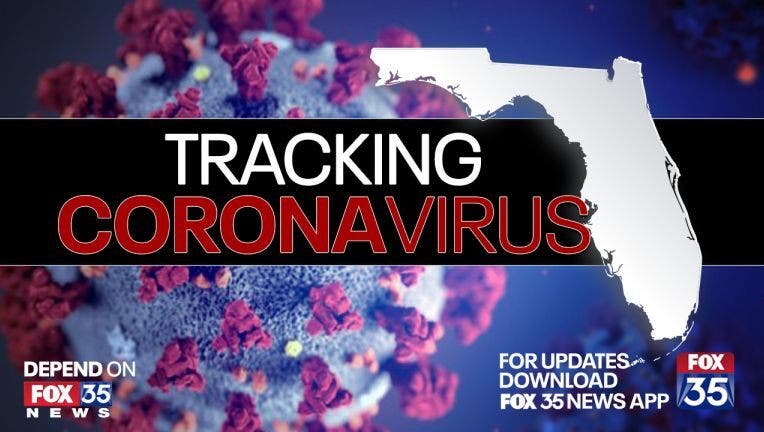10,577 new COVID-19 cases reported in Florida on Saturday; total deaths top 20,000

LAKE MARY, Fla. - State healthcare agencies on Saturday released the latest coronavirus numbers in Florida, marking three consecutive days with new cases totaling over 10,000. This week's data represents some of the highest single-day case counts since July.
The Florida Department of Health reported 10,577 new COVID-19 cases, with an additional 129 deaths.
Those figures bring the total number of cases reported in the state since the pandemic began to 1,116,973, with 20,049 total deaths to date, which includes 19,785 residents and 264 non-residents.
The number of people hospitalized with a “primary” diagnosis of COVID-19 across the state stands at 4,509, with approximately 23% of hospital beds available statewide. The percentage of available adult intensive-care unit beds statewide is 20%.
In Central Florida, Orange County leads the total number of cases (resident and non-resident) reported since the beginning of the pandemic at 63,281 and 679 deaths. Osceola County reports the second-highest total among Central Florida counties at 21,268 and 268 deaths. Flagler County has the lowest number of total cases reported since March at 3,024 and 46 deaths.
MORE CORONAVIRUS-RELATED HEADLINES
Tune in to FOX 35 Orlando for the latest coronavirus news
If you are having trouble seeing the map or using it (especially on a mobile device), click here to load in a new window.
Florida is in phase three of reopening with no limitations on restaurants. They must operate at a minimum of 50 percent capacity, regardless of rules by the local government.
The original plan for Phase 3 allowed for the following changes:
- Individuals older than 65 years of age and individuals with a serious underlying medical condition can resume public interactions but should practice social distancing.
- Non-vulnerable populations should consider minimizing time spent in crowded environments.
- Non-essential travel may continue.
- Employees should resume unrestricted staffing of worksites and implement the final phasing in of employees returning to work.
- Employees should resume non-essential travel and adhere to CDC guidelines regarding isolation following travel.
- Local government meetings should return to in-person quorum and public participation for local government bodies.
- Bars, pubs, and nightclubs that derive more than 50 percent of sales from alcohol should operate at full capacity with limited social distancing protocols. Businesses should maintain adequate sanitation practices.
- Restaurants and food service establishments may operate at full capacity with limited social distancing protocols. Businesses should maintain adequate sanitation practices.
- Gyms and fitness centers should open to full capacity but should maintain adequate sanitation practices among employees and patrons during all hours of operation.
- State parks should be fully opened, including overnight accommodations. Beaches should remain fully open.
- Large venues such as movie theaters, concert halls, and bowling alleys should re-open fully with limited social distancing protocols.
- Large spectator sporting events should consider reducing capacity with limited social distancing protocols.
- Theme parks may return to normal operations with limited social distancing protocols.
- Salons, barbershops and nail salons, should operate under full capacity but should consider removing all unnecessary, frequent-touch items such as magazines and newspapers, and maintain sanitation standards.
- Retail businesses should operate at full capacity.
Coronavirus can spread from person to person through small droplets from the nose or mouth, including when an individual coughs or sneezes. These droplets can land on objects and surfaces. Others can then contract the virus by touching these objects or surfaces, then their eyes, nose or mouth.
As stated before, symptoms of the coronavirus include fever, cough and shortness of breath. They may show in as few as two days or as many as 14 days following exposure, the Florida Department of Health says. Most people recover from COVID-19 without special treatment, but the elderly and those with underlying medical problems are more likely to develop serious illness.
If you display coronavirus symptoms, you should contact a local health organization and make them aware of your condition prior to arrival while also following specific instructions or guidelines they may have.
If you are experiencing a medical emergency, call 911 and let them know if you have been infected or believe that you may be. If you are infected, a medical professional or another authority will likely advise that you remain isolated while sick. This includes staying at home and not going into public places or large events.
Please visit the Department’s dedicated COVID-19 webpage for information and guidance regarding COVID-19 in Florida.
For any other questions related to COVID-19 in Florida, please contact the Department’s dedicated COVID-19 Call Center by calling 1-(866) 779-6121. The Call Center is available 24 hours a day. Inquiries may also be emailed to COVID-19@flhealth.gov.

